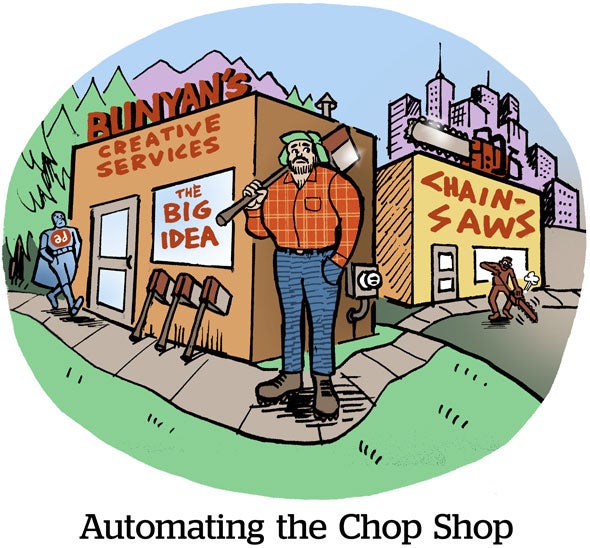Generative AI advocates hype the technology’s ability to liberate workers from tedious tasks.
As it turns out, that use case is well suited to the curation craze sweeping digital advertising.
The process of setting up curated private marketplaces (PMPs) for bespoke audiences and vetting what inventory gets included can be incredibly time-consuming and tedious for agency teams, said Ally Zingarelli, director of programmatic, Americas, at WPP agency GroupM. So agencies like GroupM and its sub-brand EssenceMediacom are turning to AI tools to help lighten the load.
For example, GroupM works closely with AI marketing platform Cognitiv. The agency uses Cognitiv’s ContextGPT solution to generate PMPs that include online video inventory likely to appeal to the unique audiences GroupM creates for its clients’ campaigns.
Cognitiv takes on the heavy lift of generating site inclusion lists for these PMPs based on contextual signals, while GroupM provides oversight and approval to ensure the PMPs align with the campaign’s goals.
That relationship has helped Cognitiv fine-tune ContextGPT to meet the evolving needs of digital ad agencies, said Cognitiv Chief Science Officer and Co-Founder Aaron Andalman.
And that arrangement will continue to prove instrumental, he said, because Cognitiv announced today an expanded partnership with OpenAI, whose LLM technology underpins ContextGPT.
OpenAI partnership
The closer collaboration between Cognitiv and OpenAI will give the ad tech platform greater capacity to service ad agencies like GroupM, Andalman said.
Cognitiv originally built ContextGPT using an open-source LLM called BERT. But in 2023, OpenAI launched an API that allowed Cognitiv to test its LLM models, and as a result, ContextGPT saw a jump in performance, Andalman said. ContextGPT has relied on a combination of in-house AI tech and OpenAI’s LLM models since 2023.
However, OpenAI puts rate limits on its API access, which throttles the amount of processing that can be done through API integrations, Andalman said. But with this expanded partnership, Cognitiv gets about a 10x higher rate limit than before, which will allow it to scale ContextGPT’s functionality across a much larger pool of longtail sites.
Today, ContextGPT relies on a database of contextual signals pulled from more than three billion URLs, and it scrapes millions of pages a day, Andalman said – hence the need for more computing capacity.
The OpenAI partnership is also now positioned to expand ContextGPT into new areas, like multimodal machine learning, Andalman said. Currently, the tool only analyzes on-page text to determine the context of video ad placements, but Cognitiv is interested in evolving the tech to consider the page’s HTML and the video content itself, he said.
Plus, the deeper partnership with OpenAI will allow Cognitiv to expand ContextGPT’s service to a wider group of advertisers, Andalman said.
Currently, Cognitiv has about 125 clients using the tool – a number that has grown significantly over the past year, he said. That number will likely continue to grow as AI tools become more embedded in agency workflows.
AI in action
GroupM’s own approach to AI is emblematic of how agencies are increasingly relying on AI tools to take the tedium out of programmatic targeting and optimization.
GroupM parent company WPP has been open about its embrace of AI tech. GroupM recently enacted a “100 days of AI” challenge for its agencies, with the goal of performing different tasks using AI each day, Zingarelli said.
Although agencies are increasingly relying on automated AI tools, they need to balance the use of those tools with their legacy business models, she added.
Typically, ad agencies are paid based on how many resources they dedicate toward serving a particular client. That includes how many account reps are servicing the account.
So the goal for an agency isn’t to use AI to reduce the number of employees working on an account, Zingarelli said. Rather, the goal is to use the same number of account reps but increase those reps’ productivity by automating lower-order tasks like reviewing PMP site inclusion lists.
That’s exactly what GroupM uses Cognitiv for, she said. A GroupM agency will provide a target audience for a given campaign – say “Digital Entertainment Fans” – and Cognitiv will feed into ContextGPT a prompt for a campaign targeting that audience.
The tool will then return a list of sites that are likely to appeal to that audience, based on its database of billions of site evaluations. A Cognitiv rep whittles that list down based on parameters provided by the agency. The agency then reviews the inclusion list, and if everything looks OK, the account rep can pass that list to a curation partner to create a PMP. These PMPs can be further optimized and iterated on throughout the campaign based on how they’re performing.
“Saving time going back and forth on troubleshooting deals, creating audiences and optimizing audiences is a huge plus for us,” Zingarelli said. “Because then we can spend more time going through the overall numbers, creating larger tests and creating more interesting brand-lift studies beyond the standard approaches.”
The process seems to be paying off by making GroupM’s campaigns more efficient. In a recent campaign for an entertainment brand, GroupM agency EssenceMediacom was able to achieve an 83% lower cost per unique reach (CPUR) than the agency’s 40-cent CPUR benchmark.
Cognitiv also shared some numbers from another recent GroupM campaign that used ContextGPT. This campaign was for an auto brand that wanted to dynamically place ads in contexts that would appeal to three different audiences: first-time car buyers, experienced owners and outdoor enthusiasts. By generating different contextual PMPs for each of these audiences, the brand saw a 34% reduction in cost per lead.
Those efficiency gains explain why many advertisers now expect their agencies to use AI tools, Zingarelli said.
“We’re expected to perform better and perform quicker,” she said, “so we have to adopt this.”













